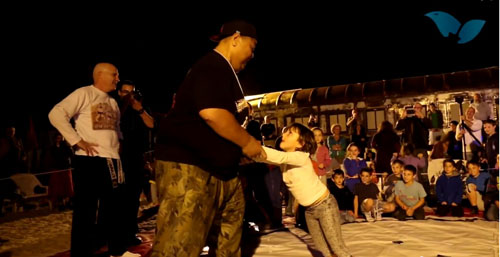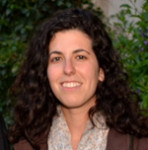
By Anav Silverman

JERUSALEM–It’s not every day that a world champion sumo wrestler visits Israel’s capital. But on Tuesday, October 21, Israelis of all ages watched in fascination as the Hawaiian-born Japanese-Samoan former sumo star, Konishiki Yasokichi shared his moves during a special workshop for children in Jerusalem.
The sumo wrestling workshop was part of the first Japanese Culture Week, held in cooperation with the Embassy of Japan, the Jerusalem Municipality, the Israel Foreign Ministry and the Israeli Center for the Advancement of Culture and Knowledge from October 19 – 25.
Today a popular celebrity in Japan, Konishiki, during the height of his career, reached ozeki, the second highest rank in sumo, a sport with origins that go back 2,000 years ago.
“It’s my first time in Jerusalem,” said Konishiki in an interview with Tazpit News Agency. “I’ve always wanted to visit and it’s been an exciting experience to be here in the Holy Land, teaching kids sumo wrestling.”
“It’s a lot calmer here than I thought it would be,” added the legendary sumo wrestler, who has been living in Japan for 32 years.
In addition to sumo wrestling, the new cultural festival also featured Sake tastings, Japanese music shows, tea ceremonies, Ikebana films, Japanese cooking and Origami workshops.
Israel has been growing increasingly close to Japan recently. Following a successful visit by Prime Minister Benjamin Netanyahu to Japan earlier in May, Israel became the first country that Japan signed an Industrial R&D (Research and Development) Collaboration Agreement during a visit by the Japanese Economic Minister to Israel in July.
The relations are of particular importance given Japan’s advanced technology and strong economy, which is ranked third in the world in terms of GDP.
“We are building different levels of connections with Japan,” said Hagai Shagrir, Director of the North East Asia Department of the Israel Foreign Ministry. “Connections are being formed both on a government level with ministers and leaders and also between our people in the areas of technology, science and culture,” Shagrir told Tazpit.
“We hope to see increased tourism between both Japan and Israel as well,” said Shagrir, whose department oversees relations with Japan, China and South Korea.
“Although we are geographically very far apart, we share some similarities,” Shagrir told Tazpit. “Both countries do not have natural resources and consequently we have had to develop our human resources. Both Japan and Israel have invested greatly in education.”
“As an Israeli, I respect the ancient and beautiful elements of Japanese art and culture along with the modern elements,” commented Eyal Lavit, one of the organizers of the Japan Culture Week.
For Emy Osaka, who grew up in southwestern Japan but has been living in Israel for 20 years and speaks Hebrew fluently, Japan Culture Week has been an exciting event. “Seeing Konishiki here with my kids was amazing. This event makes Jerusalem feel more like home,” she told Tazpit.
“Through sumo wrestling and maybe other sports, we hope to strengthen the cultural exchange between Japan and Israel,” concluded Konishiki. “The kids here are definitely excited about it.”
*
Silverman is a staff writer for the Tazpit News Agency in Israel